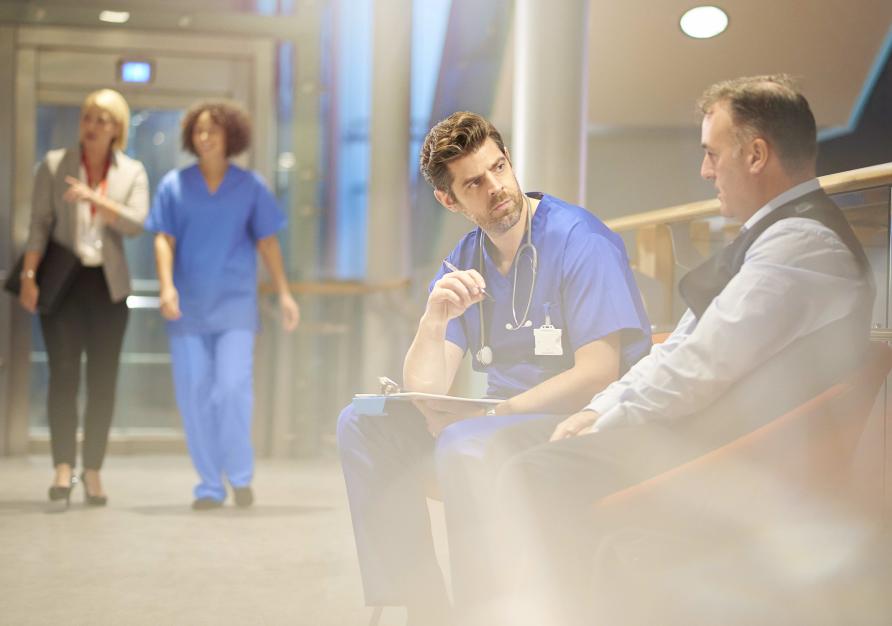
New research suggests that people in mental distress seeking help at an Emergency Department would benefit from peer-support workers who understand their experience.
Public hospital Emergency Departments are one of the main access points for people seeking mental health support, especially after-hours.
But arriving at an Emergency Department can be an intimidating experience. Many people face long wait times. It’s also a chaotic environment which may cause significant distress and trauma for people in general – but especially for those in mental distress.
So, it makes sense that employing mental health peer support workers in Emergency Departments could improve the experience for those people who are in mental distress or crisis – providing much-needed human connection and support.
When we talk about mental health peer support workers, these are people who hold professional support roles that draw on their own experiences of mental distress in order to provide empathetic and person-centred support to those people who need it.
EXPERIENCING MENTAL DISTRESS
“Someone to be with you when other people haven’t got time and there’s a long gap, just to explain what’s going on, or sit with you and be present with you,” Focus group participant.
Our work, the Peers in Emergency Departments Project funded by the Melbourne Social Equity Institute, has investigated the role that peer support workers could play within Emergency Departments.
People who are experiencing mental distress may arrive at a hospital with overwhelming feelings of distress, including thoughts of self-harm and suicide.
These feelings may arise during a period of mental ill-health, or during immense psychological and social stress, or include substance abuse – so improving the response to these people when they seek help or arrive at an Emergency Department is critical.
THE ROLE OF EMERGENCY DEPARTMENT STAFF
“We kind of put them [individuals experiencing mental distress] on the back burner because they’re kind of, they’re medically stable so you can move onto your patients that you need to do things for clinically,” – Emergency Department nursing staff.
In a busy hospital, staff must make critical decisions in a high-pressured, medically acute environment and nursing staff report often feeling ill-equipped to respond to people experiencing mental distress.
Emergency Department staff also report facing substantial barriers to gaining more mental health training, including time pressures as well as lack of access and resources.
So, mental health peer support workers may prove a vital asset because they can support people using recovery-oriented ways of working such as encouraging hope, mutuality and choice – as well as help people navigate the Emergency Department process, advocate for their rights and be an understanding presence.
Peer support workers are already widely employed throughout Victoria’s mental health system and contribute to improved outcomes for people using mental health services by helping to increase their feelings of hopefulness and connection.
They also contribute to a more recovery-oriented organisational culture and raise expectations of what’s possible for people using mental health services.
But how can the experience of mental health peer support workers be enhanced in Emergency Departments?
THE LIVED EXPERIENCE
Existing peer support workers are highly valued and advocated for by Emergency Department nursing staff.
One worker we spoke to explained: “Sometimes [the peer support worker] can be an absolute godsend, like the patients, you can see they’re starting to escalate and you just don’t have time to go in there and sort of calm them down.”
Lived experience experts – people who identify as having personal experiences of mental health challenges and of using mental health services – have played a vital and essential role in our research, working alongside academics from social work, nursing, psychiatry and architecture.
Importantly, they have helped shape our recommendations.
“I just think that some information that comes from lived experience knowledge comes across in a different way than a clinician would,” – Focus group participant.
IMPLEMENTING CHANGE
Our research recommends building a stronger understanding of peer-support work and taking active steps to foster the vital relationship between peer support workers and Emergency Department staff.
It’s also essential that more than one peer support worker is employed in an Emergency Department team, so they are not working in isolation.
Of course, implementing mental health peer support work within Emergency Departments is a complex challenge.
Our research highlighted some caution when it comes to bringing peer support into this highly medicalised setting. For example, a balance still needs to be found that recognises the relationship-based practice that is unique to peer support roles, that is in contrast to the medical focus of an Emergency Department.
There are several potential ways of tackling this, including funding community-based alternatives or looking at separate waiting areas within or close to Emergency Departments.
Our research has found the potential positive impact of peer support for those in distress, families and Emergency Department nursing staff was unequivocally supported. But hurdles related to the physical environment and workplace culture within Emergency Departments must be overcome.
This would allow more mental health peer support workers to become a feature of Emergency Departments in Australia and ideally a better experience for the people who need access to them.
This article was originally published on HOW COULD MENTAL HEALTH PEER SUPPORT WORKERS IMPROVE EMERGENCY DEPARTMENTS?